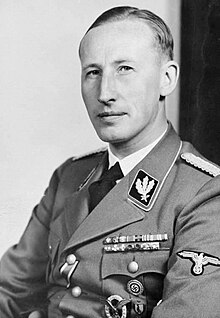
Do you know Bernie Gunther, Philip Kerr's Nazi-era Berlin detective? Berliners are known for their cynicism and mordant humor, but even among Berliners, Bernie Gunther stands out. Like a Teutonic Sam Spade, Bernie is a wisecracking, tough-talking hardhead who stubbornly refuses to kowtow to anybody, even when he knows it would be a lot better for his health and well-being.
In Prague Fatale, number eight in Philip Kerr's Bernie Gunther series, it's 1941 and Bernie has returned to Berlin from the Eastern Front. He's relieved to have left the East, but he's not happy and is unlikely ever to be happy again. He's seen too much, done too much. As a member of the SD, the intelligence arm of the SS, he witnessed "special actions," in which Jews––men, women and children––were murdered en masse, and Bernie himself executed Russian POWs suspected of being agents for the Soviet NKVD intelligence service.
Now back as a detective with Berlin's Kriminalpolizei ("Kripo"), Bernie is investigating the suspicious death of a railway worker who'd come to Berlin from the Netherlands. That's the investigation Bernie's officially assigned to. Off the books, though, he's investigating the story behind a mysterious package a bar girl was asked to deliver. Bernie's unofficial investigation began when he rescued the bar girl from an attack on the menacing, blacked-out streets of the capital. If there's one thing Bernie can't resist, it's a beautiful damsel in distress, and this bar girl has landed herself in some real trouble.
 |
| Reinhard Heydrich |
In the countryside near Prague, at Heydrich's palatial home (stolen from a Jewish family), Bernie has to rub shoulders with a large collection of Nazi bigwigs, there to celebrate Heydrich's appointment as Reichsprotektor. They are every bit as unsavory as Bernie knew they would be, and he hopes to finish his assignment and get out of Prague pronto. His hopes are dashed when, one morning, the body of Heydrich's newest adjutant is found shot twice in the victim's locked bedroom.
Heydrich puts Bernie in charge of the investigation. It's a puzzler. How was the man killed in a locked room? Is there something in this new adjutant's past that led to his murder? Is there a thread that connects the adjutant's murder, the attempts to murder Heydrich, Heydrich's search for a Czech spy within Germany's upper echelons and maybe even Bernie's investigations back in Berlin? On a more personal note, what price will Bernie have to pay for subjecting Heydrich's high-powered Nazi thugs to questioning, Gunther-smartmouth-style?
Author Philip Kerr walks a fine line with the Bernie Gunther series. The books are written in a wisecracking style, and we laugh at Bernie's observations about the absurdities of life in the Third Reich. But, over the years of his experience with the Nazis, he never kids himself about what he learns of the depths of their depravity, or makes excuses about the complicity of all Germans, himself included, in the regime's crimes.
This novel and its predecessor (Field Gray) are the first in the Bernie Gunther series to go into detail about Bernie's World War II experiences, including his service in the SS. Kerr manages to keep Bernie a deeply flawed but sympathetic character despite that. In Bernie, we see a man in a country gone mad, where conventional morality has been subverted to a genocidally racist philosophy. He is faced with horrible choices and his moral dilemmas force us to ask ourselves what we would do in Bernie's situation.
Kerr is clearly well-versed in the history of Nazi Germany. He places Bernie in the midst of real characters and events, and weaves together fact and fiction to make an entirely believable story. Kerr doesn't use his depth of knowledge in a show-offish way but, instead, he subtly imbues every scene with the language, sights, sounds, tastes and smells of the time and place, so that the overall effect is that we live in that world with Bernie.
Note: A version of this review appears on the Amazon product product page under my Amazon user name. I received a free review copy of this book.

.jpg)


SMM, you've made this book irresistible. A locked room mystery with the Kripo. Oh my!
ReplyDelete